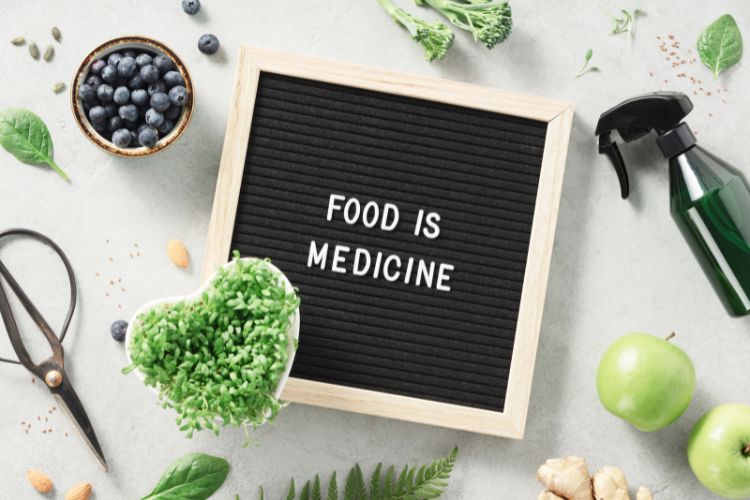I remember a time when I was girl about ten or twelve years old and I was learning about how various foods affect our health. Some foods supply our bodies with energy. Some foods are the building blocks to grow muscles and bones. And yet other foods supply us with nutrients that create hormones, immune cells, and help our organs function properly. Without the nutrients found in these, people get sick. But with the right combination of foods and the nutrients they provide we can grow and thrive! This fascinated me that something as simple as an apple could help keep us healthy.
Since then, I’ve had this inner knowing that everything we need to support our health is already available to us in the form of food and herbs. Yes, of course there is a need for medicine and medical intervention. There is no doubt in my mind that the advances in medicine have been tremendous and we will continue to learn more and more about medical therapies. However, even illnesses that need to be treated with medical therapy also need the support of nutrient therapy to really help a person heal. I also know that given the right nutrients, we can often prevent chronic illness before it even starts.
You see, food is not just fuel. It’s not just about satisfying our cravings or filling our bellies. Food is a powerhouse of nutrients, vitamins, minerals, and antioxidants that can either propel us to ward vibrant health or set the stage for health issues. Let’s take a look at the top 4 ways that food can either damage or support our health.
Nourishment for Healing – When we opt for whole, unprocessed foods such as colorful fruits and vegetables, wild caught or grass-fed proteins, and healthy fats, we’re not just satisfying hunger pangs. We’re offering our bodies a blend of nutrients that aid in cellular repair, boost our immune system, and aid in our recovery.
Balance Hormones – Hormones can seem like a tricky thing, right? In fact, food plays a significant role in producing and balancing hormones. Did you know that just one Brazil nut contains the recommended daily allowance of selenium – the primary mineral need to produce estrogen and testosterone? Iodine found in wild caught fish, seaweed and kelp, yogurt, eggs and even prunes – is the primary mineral needed for proper thyroid function. Nutrient dense foods help both the production and regulation of hormones which improves our moods, helps us get proper sleep, and optimized energy levels.
Fight Inflammation – Inflammation is a condition that 20 to 30 years ago wasn’t really even discussed unless you had an injury and experienced a swelling at the site of that injury. Now internal inflammation is a serious threat to the health of many people. Internal inflammation can result from exposure to food and environmental toxins, chemicals, infection, and autoimmune disorders. Inflammation just might be the culprit behind health issues from joint pain to chronic disease. But, with the right foods – including those that are omega-3 rich and foods that are high in antioxidants such as leafy greens, vibrant berries, citrus and colorful vegetables – fighting inflammation can be a breeze. Make sure to choose foods that are naturally grown or organic if possible and reduce the potential for ingesting harmful pesticides, growth hormones, and other toxins.
Nurture a Healthy Gut – The gut – the gateway to your health! Having a healthy gut lining that allows only nutrients to be absorbed and keeps pathogens out is key to your overall health. Food choices play an important role when it comes to gut health. That means that reaching for foods that support a diverse array of gut-friendly bacteria, aiding digestion and enhancing nutrient absorption are at the top of the list to include. The most common irritants that can be damaging to the gut include processed foods, alcohol, gluten, lectins, and any foods that you have a known sensitivity to or are allergic to.
Food isn’t simply sustenance – Food is the foundation of our health. Not all foods suit everyone so it’s important to pay attention to how your body responds to certain foods and adjust your choices accordingly. But there are a few rules across the board that we all need to be mindful of regardless of the variances in our food choices.
The Food Is Medicine Checklist
- Choose several servings of fruits and vegetables from a large variety of colors every day.
- Eat high quality protein that is wild caught or grass-fed without pesticides and growth hormones.
- Include omega-3 fats in the form of salmon or other cold-water fish, butter from grass-fed cows, walnuts, flax and pumpkin seeds. Consider supplementing with an EPA-DHA supplement or better yet a tablespoon of cod liver oil daily.
- Use gentle cooking methods to preserve nutrients such as steaming, grilling, sauteing, and slow cooking.
- Drink lots and lots of water! Water is the most important nutrient of all. Drink at least 10 to 12 cups of water daily.
- Avoid excessive caffeine and alcohol
- Avoid all processed foods, seed oils and vegetable oils.
- Avoid any foods that you are allergic or sensitivity to.
Well, there you have it – The Food Is Medicine Checklist. By choosing whole, nutrient-dense foods and viewing them as your personal medicine cabinet, you’re not just eating; you’re nourishing and healing your body from the inside out.
So, here’s to savoring those vibrant salads, relishing those nutrient-packed smoothies, and celebrating the rainbow on our plates—a surefire way to turn our meals into a delicious prescription for wellness!
For your complete guide to improving your health with REAL food and over 100 gluten-free and paleo recipes order a copy of The Simply28 Real Food Cookbook today!





